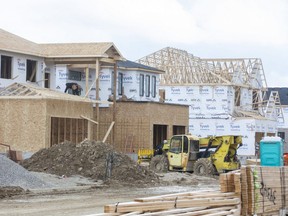Up to $100M: estimated cost to London of Ontario building law changes
London could face up to a $100-million shortfall with the Ontario government proposing sweeping changes to building legislation that may slash what builders pay the city, a staff report warns.

Article content
London could face a shortfall of up to $100 million as a result of sweeping changes to building legislation proposed by the province that may slash what builders pay city hall, a staff report warns.
The province wants to change how development charges are paid by builders to municipalities and that may force the city to dip into reserves, borrow or hit taxpayers with an increase, said Ward 8 Coun. Steve Lehman, who chairs city council’s planning and environment committee.
“It’s very concerning. I know government wants to bring house prices down, but property taxes are part of affordability,” he said. “This is big. It will have a major impact on the city and its budget.”
Shifting building costs from developers to taxpayers is only the tip of a development iceberg that will drastically alter how communities are constructed.
Bill 23, the More Homes Built Faster Act, will shift power to developers as conservation authorities would have their power stripped, trees and green spaces would be reduced, cities would have less input on building design and protections for natural habitat would be lessened, a staff report says.
The report, going to council’s strategic priorities and policy committee Tuesday, said the law’s impacts could cost the city between $25 million and $100 million over the next five years.
“That is a worst-case scenario,” said Mike Wallace, director of the London Development Institute that works with builders. “You have to take this with a grain of salt. It’s a change for the city and we have no issue with it. We think it will help.”
The legislation, passed last November but not yet implemented, would have conservation authorities and city planning departments focus on their core mandates and have no say on building design, he said.
As for the cost, municipalities will be expected to use reserve funds because the province wants excess funds spent, Wallace said.
But London has no “mounds of reserve funds” to pay for this, Lehman said. “It’s one of those things that’s hard to believe. The province expects us to find this money. It’s incomprehensible.”
The act is part of the Ontario government’s push to build 1.5 million homes by 2032, including 47,000 in London.
The legislation proposes reducing, delaying, or ending some development charges, including a five-year “phase-in” on some fees that would have builders pay 80 per cent in the first year and then increase by five per cent a year. The savings to builders is intended to cut costs and speed building, Wallace said.
“We believe the province’s goal is to make sure municipalities are appropriately spending DC (development charge) reserve funds,” he said. “The government is making policy and legislative changes that will encourage and incentivize change.”
In addition to shifting building costs from builders to taxpayers, the legislation would allow for greater intensification of home construction, including smaller-scale apartment buildings, offer incentives for non-profit or affordable housing and boost transparency in how development charges are spent, the city staff report says.
“The legislative changes of the More Homes Act will place considerable pressure on the city’s upcoming multi-year budget process,” it said.
As a result, the city must “consider the reallocation of costs presently funded through development charges and other developer/builder contributions.”
In addition, the legislation would weaken conservation authorities sway over building by removing their ability to “consider the ‘conservation of land’ or ‘pollution,’ ” when reviewing development applications. They also wouldf not be able to appeal many planning decisions.
Municipalities would no longer be able to limit building on natural woodlands and natural habitats like wetlands.
“These changes have significant implications in London,” the report said.
Developers also would be able to propose their own green spaces for development, including private parks to meet green space requirements, it said. “The proposed land for parkland does not need to be in locations desired by the city and can be . . . utility corridors and easements . . . or privately owned parks.”
Trees would also take a hit as “new regulatory restrictions remove existing controls in place to protect trees to be retained on development lands,” the report says.
Site plan control would be eliminated for buildings with less than 10 units and if that runs afoul of neighbours’ concerns, the city would have limited power to resolve a dispute.
“Development externalities will become a private matter between two landowners,” the staff report says.
More, higher-density wood-framed buildings would be built, the Ontario Heritage Act would raise the bar for designation, meaning fewer properties would be considered heritage. The city also won’t be able to influence exterior design or building appearance through site plan control.
“We pay architects good money for design we think will meet the marketplace,” Wallace said. “Why does city hall have more of a say on that?”
Editor’s note: An earlier version of this story referenced taxpayer-funded reserve funds, when the topic was reserve funds filled by charges applied to developers, so-called DC (development charge) reserve funds. It has been updated.








Postmedia is committed to maintaining a lively but civil forum for discussion. Please keep comments relevant and respectful. Comments may take up to an hour to appear on the site. You will receive an email if there is a reply to your comment, an update to a thread you follow or if a user you follow comments. Visit our Community Guidelines for more information.